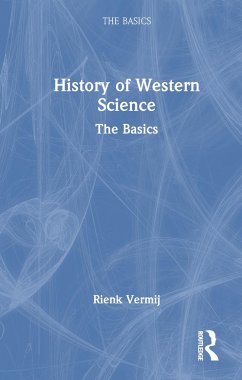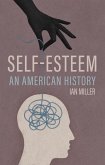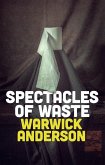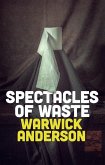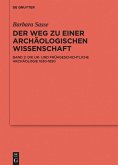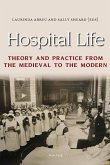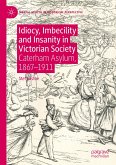- Gebundenes Buch
- Merkliste
- Auf die Merkliste
- Bewerten Bewerten
- Teilen
- Produkt teilen
- Produkterinnerung
- Produkterinnerung
A History of Western Science: The Basics, offers a short introduction to the history of western science that is accessible to all through avoiding technical language and mathematical intricacies.
Andere Kunden interessierten sich auch für
![Self-Esteem Self-Esteem]() Ian MillerSelf-Esteem22,99 €
Ian MillerSelf-Esteem22,99 €![Spectacles of Waste Spectacles of Waste]() Warwick AndersonSpectacles of Waste13,99 €
Warwick AndersonSpectacles of Waste13,99 €![Spectacles of Waste Spectacles of Waste]() Warwick AndersonSpectacles of Waste43,99 €
Warwick AndersonSpectacles of Waste43,99 €![Die Archäologien von der Antike bis 1630 Die Archäologien von der Antike bis 1630]() Barbara SasseDie Archäologien von der Antike bis 1630129,95 €
Barbara SasseDie Archäologien von der Antike bis 1630129,95 €![Illness and Healing Alternatives in Western Europe Illness and Healing Alternatives in Western Europe]() Hilary Marland / Hans Waardt (eds.)Illness and Healing Alternatives in Western Europe195,99 €
Hilary Marland / Hans Waardt (eds.)Illness and Healing Alternatives in Western Europe195,99 €![Hospital Life Hospital Life]() Hospital Life91,55 €
Hospital Life91,55 €![Idiocy, Imbecility and Insanity in Victorian Society Idiocy, Imbecility and Insanity in Victorian Society]() Stef EastoeIdiocy, Imbecility and Insanity in Victorian Society59,99 €
Stef EastoeIdiocy, Imbecility and Insanity in Victorian Society59,99 €-
-
-
A History of Western Science: The Basics, offers a short introduction to the history of western science that is accessible to all through avoiding technical language and mathematical intricacies.
Hinweis: Dieser Artikel kann nur an eine deutsche Lieferadresse ausgeliefert werden.
Hinweis: Dieser Artikel kann nur an eine deutsche Lieferadresse ausgeliefert werden.
Produktdetails
- Produktdetails
- Verlag: Taylor & Francis Ltd
- Seitenzahl: 256
- Erscheinungstermin: 11. Dezember 2023
- Englisch
- Abmessung: 198mm x 129mm
- Gewicht: 400g
- ISBN-13: 9781032346489
- ISBN-10: 1032346485
- Artikelnr.: 68710576
- Verlag: Taylor & Francis Ltd
- Seitenzahl: 256
- Erscheinungstermin: 11. Dezember 2023
- Englisch
- Abmessung: 198mm x 129mm
- Gewicht: 400g
- ISBN-13: 9781032346489
- ISBN-10: 1032346485
- Artikelnr.: 68710576
Rienk Vermij is a Professor at the Department of the History of Science, Medicine, and Technology of the University of Oklahoma. His research topics include early ideas on earthquakes, the reception of Copernicanism, and the Enlightenment. He has published several books and many articles.
Contents Introduction Part I. The Scientific Revolution1. Antiquity and the
Middle Ages Greek philosophers and nature Greek
mathematics Medicine in antiquity The classical tradition in
mediaeval Europe2. The sixteenth century: the Aristotelian worldview in
decline New intellectual currents: humanism and hermeticism
Natural history and medicine Mathematics and 'natural magic'
Astronomy Philosophy of nature3. The seventeenth century: a new
worldview Galileo and a new view of the heavens Descartes and
mechanistic science The emergence of an experimental tradition
Mathematization of science The mathematical science of Isaac
Newton A revolution in the prevailing worldview? Part II. Autonomous
science: methods, theories and researchers 1700-20004. The eighteenth
century: disseminating the idea of science Knowledge and practice:
instruments Collecting and classifying: natural history From
alchemy to chemistry Newtonian mechanics and its problems5. The
nineteenth century (i): science at the service of the rationalization of
society A 'scientific' system of measurement The modern
hospital Observatories, measuring stations and a global science
Science and Western imperialism6. The nineteenth century (ii): professional
science Universities and professors Women in science
Laboratories Classification and conferences The rise of the
experiment: physiology Measuring and experimenting in the study of
nature Further mathematization Statistics7. The twentieth
century: industrial science The rise of industrial science The
science of measurement Research institutes Control and
modelling Independence under pressure Part III. The scientific
worldview8. The origin of the world The Bible and the new image of
the world The development of geology The origin of the
universe9. The nature of life and the origin of human beings Early
scientific ideas about humankind and its place in the world The idea
of evolution Darwin's contribution Descent The mysteries
of the mind The mechanism of heredity Heredity and
evolution A science of human beings?10. The nature of reality A
rational world? The building blocks of real
Middle Ages Greek philosophers and nature Greek
mathematics Medicine in antiquity The classical tradition in
mediaeval Europe2. The sixteenth century: the Aristotelian worldview in
decline New intellectual currents: humanism and hermeticism
Natural history and medicine Mathematics and 'natural magic'
Astronomy Philosophy of nature3. The seventeenth century: a new
worldview Galileo and a new view of the heavens Descartes and
mechanistic science The emergence of an experimental tradition
Mathematization of science The mathematical science of Isaac
Newton A revolution in the prevailing worldview? Part II. Autonomous
science: methods, theories and researchers 1700-20004. The eighteenth
century: disseminating the idea of science Knowledge and practice:
instruments Collecting and classifying: natural history From
alchemy to chemistry Newtonian mechanics and its problems5. The
nineteenth century (i): science at the service of the rationalization of
society A 'scientific' system of measurement The modern
hospital Observatories, measuring stations and a global science
Science and Western imperialism6. The nineteenth century (ii): professional
science Universities and professors Women in science
Laboratories Classification and conferences The rise of the
experiment: physiology Measuring and experimenting in the study of
nature Further mathematization Statistics7. The twentieth
century: industrial science The rise of industrial science The
science of measurement Research institutes Control and
modelling Independence under pressure Part III. The scientific
worldview8. The origin of the world The Bible and the new image of
the world The development of geology The origin of the
universe9. The nature of life and the origin of human beings Early
scientific ideas about humankind and its place in the world The idea
of evolution Darwin's contribution Descent The mysteries
of the mind The mechanism of heredity Heredity and
evolution A science of human beings?10. The nature of reality A
rational world? The building blocks of real
Contents Introduction Part I. The Scientific Revolution1. Antiquity and the Middle Ages Greek philosophers and nature Greek mathematics Medicine in antiquity The classical tradition in mediaeval Europe2. The sixteenth century: the Aristotelian worldview in decline New intellectual currents: humanism and hermeticism Natural history and medicine Mathematics and 'natural magic' Astronomy Philosophy of nature3. The seventeenth century: a new worldview Galileo and a new view of the heavens Descartes and mechanistic science The emergence of an experimental tradition Mathematization of science The mathematical science of Isaac Newton A revolution in the prevailing worldview? Part II. Autonomous science: methods, theories and researchers 1700-20004. The eighteenth century: disseminating the idea of science Knowledge and practice: instruments Collecting and classifying: natural history From alchemy to chemistry Newtonian mechanics and its problems5. The nineteenth century (i): science at the service of the rationalization of society A 'scientific' system of measurement The modern hospital Observatories, measuring stations and a global science Science and Western imperialism6. The nineteenth century (ii): professional science Universities and professors Women in science Laboratories Classification and conferences The rise of the experiment: physiology Measuring and experimenting in the study of nature Further mathematization Statistics7. The twentieth century: industrial science The rise of industrial science The science of measurement Research institutes Control and modelling Independence under pressure Part III. The scientific worldview8. The origin of the world The Bible and the new image of the world The development of geology The origin of the universe9. The nature of life and the origin of human beings Early scientific ideas about humankind and its place in the world The idea of evolution Darwin's contribution Descent The mysteries of the mind The mechanism of heredity Heredity and evolution A science of human beings?10. The nature of reality A rational world? The building blocks of real
Contents Introduction Part I. The Scientific Revolution1. Antiquity and the
Middle Ages Greek philosophers and nature Greek
mathematics Medicine in antiquity The classical tradition in
mediaeval Europe2. The sixteenth century: the Aristotelian worldview in
decline New intellectual currents: humanism and hermeticism
Natural history and medicine Mathematics and 'natural magic'
Astronomy Philosophy of nature3. The seventeenth century: a new
worldview Galileo and a new view of the heavens Descartes and
mechanistic science The emergence of an experimental tradition
Mathematization of science The mathematical science of Isaac
Newton A revolution in the prevailing worldview? Part II. Autonomous
science: methods, theories and researchers 1700-20004. The eighteenth
century: disseminating the idea of science Knowledge and practice:
instruments Collecting and classifying: natural history From
alchemy to chemistry Newtonian mechanics and its problems5. The
nineteenth century (i): science at the service of the rationalization of
society A 'scientific' system of measurement The modern
hospital Observatories, measuring stations and a global science
Science and Western imperialism6. The nineteenth century (ii): professional
science Universities and professors Women in science
Laboratories Classification and conferences The rise of the
experiment: physiology Measuring and experimenting in the study of
nature Further mathematization Statistics7. The twentieth
century: industrial science The rise of industrial science The
science of measurement Research institutes Control and
modelling Independence under pressure Part III. The scientific
worldview8. The origin of the world The Bible and the new image of
the world The development of geology The origin of the
universe9. The nature of life and the origin of human beings Early
scientific ideas about humankind and its place in the world The idea
of evolution Darwin's contribution Descent The mysteries
of the mind The mechanism of heredity Heredity and
evolution A science of human beings?10. The nature of reality A
rational world? The building blocks of real
Middle Ages Greek philosophers and nature Greek
mathematics Medicine in antiquity The classical tradition in
mediaeval Europe2. The sixteenth century: the Aristotelian worldview in
decline New intellectual currents: humanism and hermeticism
Natural history and medicine Mathematics and 'natural magic'
Astronomy Philosophy of nature3. The seventeenth century: a new
worldview Galileo and a new view of the heavens Descartes and
mechanistic science The emergence of an experimental tradition
Mathematization of science The mathematical science of Isaac
Newton A revolution in the prevailing worldview? Part II. Autonomous
science: methods, theories and researchers 1700-20004. The eighteenth
century: disseminating the idea of science Knowledge and practice:
instruments Collecting and classifying: natural history From
alchemy to chemistry Newtonian mechanics and its problems5. The
nineteenth century (i): science at the service of the rationalization of
society A 'scientific' system of measurement The modern
hospital Observatories, measuring stations and a global science
Science and Western imperialism6. The nineteenth century (ii): professional
science Universities and professors Women in science
Laboratories Classification and conferences The rise of the
experiment: physiology Measuring and experimenting in the study of
nature Further mathematization Statistics7. The twentieth
century: industrial science The rise of industrial science The
science of measurement Research institutes Control and
modelling Independence under pressure Part III. The scientific
worldview8. The origin of the world The Bible and the new image of
the world The development of geology The origin of the
universe9. The nature of life and the origin of human beings Early
scientific ideas about humankind and its place in the world The idea
of evolution Darwin's contribution Descent The mysteries
of the mind The mechanism of heredity Heredity and
evolution A science of human beings?10. The nature of reality A
rational world? The building blocks of real
Contents Introduction Part I. The Scientific Revolution1. Antiquity and the Middle Ages Greek philosophers and nature Greek mathematics Medicine in antiquity The classical tradition in mediaeval Europe2. The sixteenth century: the Aristotelian worldview in decline New intellectual currents: humanism and hermeticism Natural history and medicine Mathematics and 'natural magic' Astronomy Philosophy of nature3. The seventeenth century: a new worldview Galileo and a new view of the heavens Descartes and mechanistic science The emergence of an experimental tradition Mathematization of science The mathematical science of Isaac Newton A revolution in the prevailing worldview? Part II. Autonomous science: methods, theories and researchers 1700-20004. The eighteenth century: disseminating the idea of science Knowledge and practice: instruments Collecting and classifying: natural history From alchemy to chemistry Newtonian mechanics and its problems5. The nineteenth century (i): science at the service of the rationalization of society A 'scientific' system of measurement The modern hospital Observatories, measuring stations and a global science Science and Western imperialism6. The nineteenth century (ii): professional science Universities and professors Women in science Laboratories Classification and conferences The rise of the experiment: physiology Measuring and experimenting in the study of nature Further mathematization Statistics7. The twentieth century: industrial science The rise of industrial science The science of measurement Research institutes Control and modelling Independence under pressure Part III. The scientific worldview8. The origin of the world The Bible and the new image of the world The development of geology The origin of the universe9. The nature of life and the origin of human beings Early scientific ideas about humankind and its place in the world The idea of evolution Darwin's contribution Descent The mysteries of the mind The mechanism of heredity Heredity and evolution A science of human beings?10. The nature of reality A rational world? The building blocks of real
